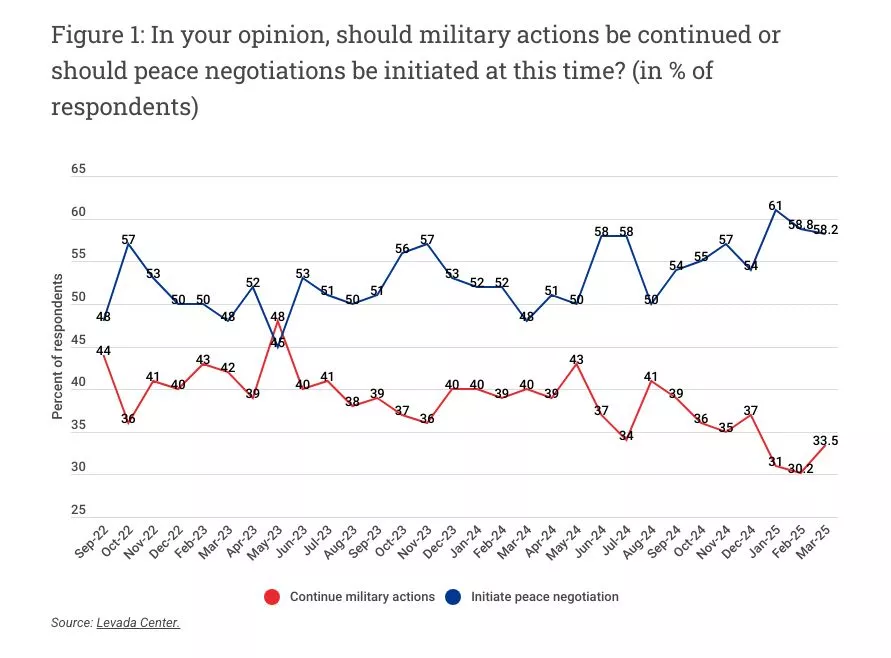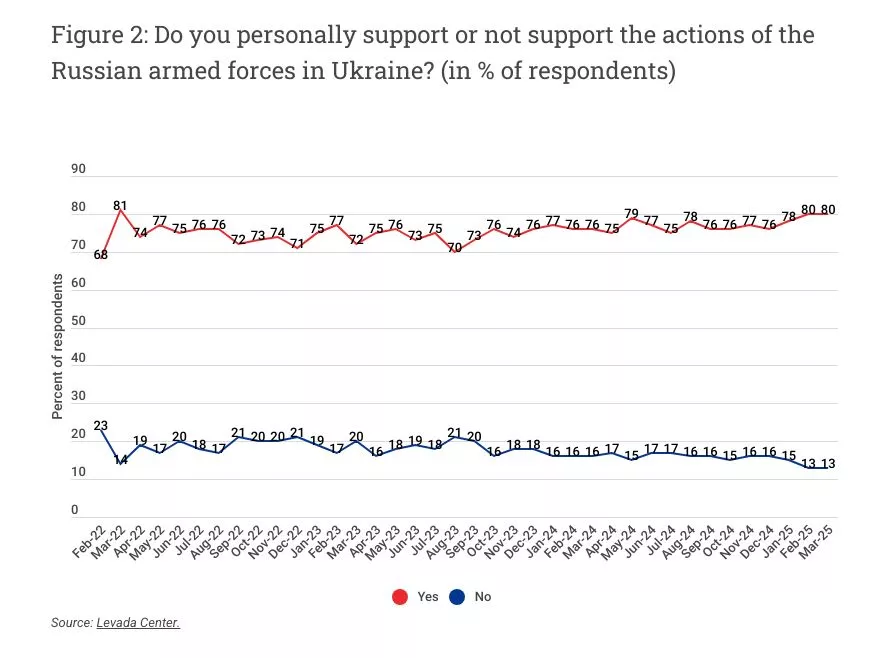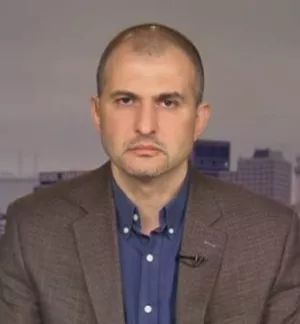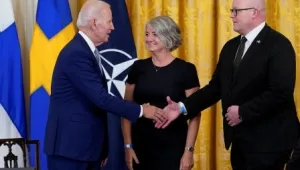The Levada Center’s latest poll shows that a majority of Russians continued to support the launch of peace negotiations to end the Russian-Ukrainian war in March (58%), though, as usual, one should keep in mind on what conditions these dovish respondents would agree to end the conflict. In contrast, only 33% favored continuing the war, according to Levada’s late March poll, the results of which were released April 1. These results are not very different from recent polling of Ukrainians, which showed that the share of those who favor direct negotiations with Russia climbed from 38% in January to 64% in February, according to Ukraine’s Reiting pollster.

The 30-day ceasefire between Russia and Ukraine, which Donald Trump has proposed, reveals a divided Russian public: 50% of Russians support the temporary truce (with 26% strongly in support of it and 24% somewhat in support), while 41% oppose the ceasefire (with 25% strongly against it and 16% somewhat against).
| Do you personally support or not support the proposal to conclude a 30-day ceasefire between Russia and Ukraine? % (source: Levada) | |
| Definitely, yes | 25.6 |
| Rather, yes | 23.5 |
| Rather, no | 15.5 |
| Definitely, no | 25.1 |
| Difficult to say | 10.4 |
In contrast to Russians, a considerably greater share of Ukrainians support the ceasefire. As many as 77% of respondents to a March poll conducted by the Kyiv International Institute of Sociology (KIIS) said they have a positive attitude toward the proposal for a 30-day ceasefire.
Of those Russians who advocate for the ceasefire, the greatest share (29%) believe that it will end the war, which they are tired of and/or which they see as bad. Of those who oppose the ceasefire, the greatest share (37%) do so because they believe a suspension of hostilities will give Ukraine a break to rearm, regroup, prepare to continue the war and bring in mercenaries.
| Reasons for Supporting the 30-Day Ceasefire Proposal (Open question, % of respondents who support the ceasefire, March 2025, source: Levada) |
% |
Reasons for Opposing the 30-Day Ceasefire Proposal
|
% |
| The war will end / tired of war / war is bad | 29% | It will give Ukraine a break to rearm / regroup / prepare / continue the war / bring in mercenaries | 37% |
| We need peace / better than war / hope for peace | 25% | Ukraine cannot be trusted / will not honor the ceasefire terms / will deceive as before | 26% |
| To save lives / already too many deaths / too many victims | 24% | It’s pointless / meaningless / useless / there won’t be a ceasefire | 9% |
| Need to calm down / think everything through / come to an agreement | 10% | We need to finish them off / go all the way | 8% |
| Troops will regroup / gain strength / evacuate civilians / exchange prisoners | 5% | We need to conclude peace, not a ceasefire | 7% |
| I support Putin’s decision | 2% | It’s not beneficial for Russia / for us | 6% |
| Desire for peace and stability | 2% | It would prolong / drag out military actions | 3% |
| Support under specific / our conditions | 2% | The U.S. / European countries cannot be trusted | 1% |
| Troops / soldiers / loved ones will come home | 2% | Other | 11% |
| Better for both countries’ economies | 1% | Difficult to answer / No answer | 4% |
| Other | 9% | ||
| Difficult to answer / no answer | 7% |
While even those doves outnumber hawks when it comes to agreeing, in principle, to hold peace talks, the majority of Russians continued to show strong support for the country's military actions, with 79% of respondents approving of the Armed Forces' operations in Ukraine (80% in February) and 14% disapproving (13% in February), according to Levada’s poll, which was conducted in March and released April 1.

The aforementioned findings of the polls held in Russia and Ukraine suggest a 30-day ceasefire would enjoy support by around 50% of respondents or more (49% in Russia and 77% in Ukraine), exceeding the shares of those who oppose it in both countries by significant margins. However, while these voces populi in the two countries speak in favor of a temporary halt to hostilities, it remains unclear whether, if implemented, it could be followed by a lasting peace deal, as the U.S. hopes. Given the significant gap between the minimum security requirements of the parties to this conflict, including Ukraine’s European allies, a truce would risk becoming a tactical interlude rather than a path to resolution.
Simon Sardzhyan is the founding director of Russia Matters.
Opinions expressed herein are solely those of the author. Photo by wal_172619 shared under a Pixabay Content License.
Saradzhyan, Simon. “Strong Support for Ceasefire in Russia and Ukraine, But to What End?.” Russia Matters, April 4, 2025
The full text of this publication is available via Russia Matters.




